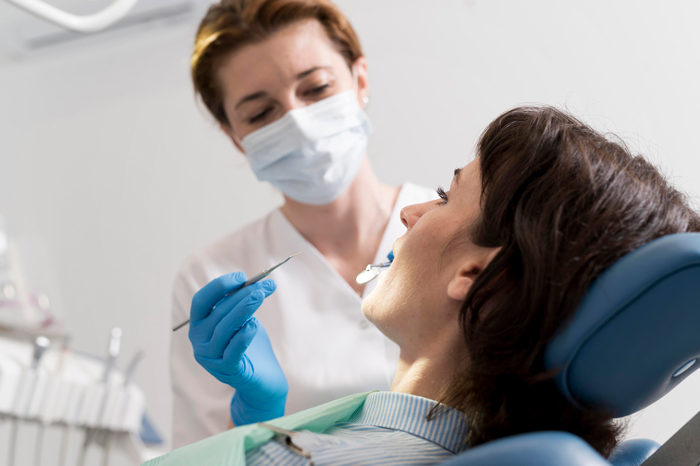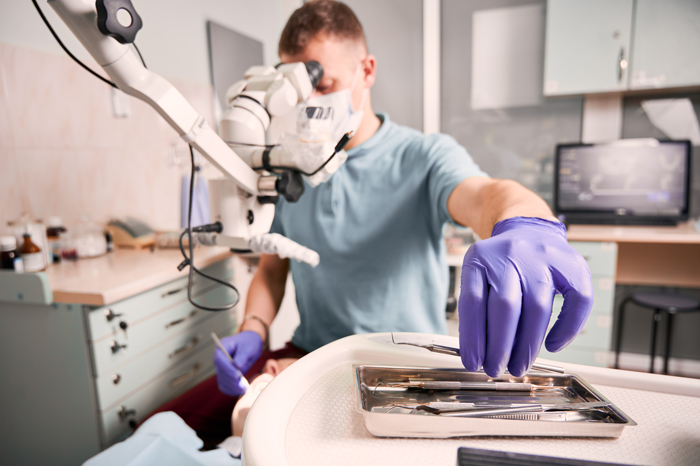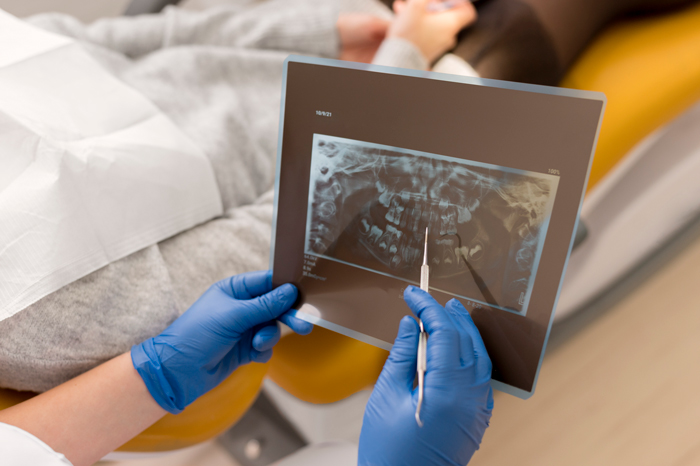Tooth Extraction Service in Broomfield, CO
What is a tooth extraction?
Tooth extraction is a dental procedure to remove a tooth from its socket in the jawbone. It is usually performed by an oral surgeon or a dentist with specialized training in oral surgery. Tooth extraction may be necessary for a variety of reasons, including severe tooth decay or damage, orthodontic treatment, or impacted wisdom teeth.
When a tooth is severely decayed or fractured, extracting it may be the best option to prevent further complications and preserve overall oral health. In cases where there is overcrowding of the teeth, removing one or more teeth can create space for the remaining teeth to properly align. This is often necessary before getting braces or other orthodontic appliances to achieve optimal results.
Wisdom teeth, also known as third molars, often require extraction due to their tendency to cause problems. These teeth can become impacted or fail to fully emerge, leading to gum inflammation, infections, and discomfort. Extracting wisdom teeth that are causing pain or affecting the alignment of other teeth can help avoid further complications.
Colorado Gum Care offers tooth extraction services in Broomfield, CO. Our skilled oral surgeons and dental professionals use the latest techniques and technology to ensure a comfortable and successful procedure. We also specialize in the pinhole surgical technique, a minimally invasive approach to treating gum recession.
If you are experiencing severe tooth pain, advanced tooth decay, or any other dental issues that may require tooth extraction, please contact us to schedule a consultation. We will assess your dental condition and recommend the most appropriate course of action.

When is tooth extraction recommended?
Tooth extraction is a common dental procedure that may be necessary for severe tooth decay, damage, or overcrowding. Colorado Gum Care offers tooth extraction services in Broomfield, CO using the latest techniques and technology. We also specialize in the pinhole surgical technique, a minimally invasive approach to treating gum recession.
If you are experiencing tooth pain, advanced tooth decay, or any other dental issues, please contact us to schedule a consultation. We will assess your dental condition and recommend the most appropriate course of action.
Here are some of the reasons why tooth extraction may be necessary:
- Severe tooth decay or damage that cannot be restored through other dental treatments.
- A broken or fractured tooth beyond repair.
- Overcrowded teeth that need to be removed to create space for proper alignment.
- Impacted wisdom teeth that are causing pain or affecting the alignment of other teeth.
Remember, tooth extraction is a routine dental procedure that aims to improve your oral health and prevent further complications.
If you are experiencing severe tooth pain, advanced tooth decay, or any other dental issues, it is essential to consult a professional.
Our team at Colorado Gum Care can assess your dental condition, discuss the treatment options available, and recommend the most appropriate course of action, including tooth extraction if necessary.
Tooth extraction types
There are two main types of tooth extraction procedures: simple extraction and surgical extraction. The type of extraction recommended will depend on the condition and position of the tooth.
- A simple extraction is used to remove teeth that are easily accessible and not impacted. The dentist will use local anesthesia to numb the area and then use forceps to remove the tooth.
- Surgical tooth extraction is used to remove teeth that are impacted or difficult to access. The dentist may need to make an incision in the gum tissue or remove some of the bone to access the tooth. Stitches may be required to close the incision.
Here are some of the factors that determine the type of tooth extraction that is needed:
- The location of the tooth
- The extent of the decay or damage
- The position of the tooth
- The patient’s overall health
In some cases, a dentist may recommend a minimally invasive tooth extraction technique, such as the pinhole surgical technique. This technique uses a small incision and special tools to remove the tooth, resulting in less pain and swelling.
The best way to determine which type of tooth extraction is right for you is to talk to your dentist. They will assess your individual situation and recommend the best course of action.
Surgical Vs. Simple Extractions
| Characteristic | Surgical extraction | Simple extraction |
| Tooth type | Impacted or difficult to access teeth | Visible and easily accessible teeth |
| Anesthesia | Local anesthesia and sedation | Local anesthesia |
| Procedure | Incision may be made in the gum tissue to access the tooth. Bone may need to be removed. Tooth may be sectioned into smaller pieces for easier removal. | Tooth is loosened with an elevator and removed with forceps. |
| Recovery time | Longer | Shorter |
| Pain | More pain | Less pain |
| Swelling | More swelling | Less swelling |
| Risk of complications | Higher | Lower |
After Tooth Extraction Broomfield
After undergoing a tooth extraction procedure, it’s important to take proper care of your mouth to ensure a smooth and speedy recovery.
Whether you’ve had a simple tooth extraction or a more complex surgical tooth removal, here are some guidelines to follow:
- Keep the area clean: Gently rinse your mouth with warm saltwater after 24 hours to help keep the extraction site clean. Avoid using mouthwash during this time as it may irritate the area. Be careful not to forcefully spit or rinse, as this could dislodge the blood clot that forms to promote healing.
- Control bleeding: It is normal to experience some bleeding after a tooth extraction. You can bite down on a clean gauze pad or a moist tea bag to help control and stop any bleeding. Make sure to change the gauze or tea bag every 30 minutes as needed. If bleeding persists or becomes severe, contact our office immediately.
- Minimize swelling: Swelling is a common occurrence after a tooth extraction. To help reduce swelling, apply a cold compress or ice pack on the cheek near the extraction site for 10-15 minutes at a time. Repeat this process at intervals for the first few hours following the extraction.
- Manage pain: It is normal to experience some discomfort after a tooth extraction. To help manage pain, take over-the-counter pain relievers as directed by your oral surgeon or dentist. Avoid aspirin, as it can increase bleeding. If prescribed pain medications, make sure to follow the instructions carefully.
- Eat soft foods: Stick to a soft foods diet for the first few days after tooth extraction. Avoid hot liquids and opt for lukewarm or cool drinks instead. Incorporate foods such as mashed potatoes, yogurt, smoothies, and soups into your diet to ensure adequate nourishment during the healing process.
- Maintain oral hygiene: Continue to brush your teeth gently, but avoid the extraction site for the first 24 hours. After that, you can carefully brush the area with a soft-bristle toothbrush, being cautious not to disturb the blood clot. Avoid using mouthwash, as it may disrupt the healing process.
- Follow post-operative instructions: Our oral surgeons will provide you with detailed post-operative instructions specific to your situation. It’s crucial to follow these instructions carefully to promote proper healing and minimize the risk of complications. If you have any questions or concerns about your recovery, don’t hesitate to reach out to our experienced team.
We also do pinhole surgical technique Broomfield. This innovative technique is used to treat gum recession without the need for traditional gum grafting surgery. The cost of this procedure will depend on various factors, including the number of teeth involved and the severity of the gum recession.
It is best to consult with a dental professional at Colorado Gum Care to determine the exact cost for your specific situation.
We are dedicated to ensuring that your dental experience with us is as comfortable and seamless as possible. By adhering to these post-operative guidelines and seeking timely care, you can look forward to a speedy recovery and return to your optimal oral health.

What to Eat After Tooth Extraction
After a tooth extraction, it is important to follow a soft diet to promote healing and minimize discomfort. Here are some tips:
- Stick to soft foods that are easy to chew and won’t irritate the extraction site.
- Avoid hot and spicy foods, crunchy or hard foods, and extremely hot or cold foods.
- Stay hydrated by drinking plenty of fluids.
Here are some specific examples of soft foods you can eat:
- Mashed potatoes
- Pureed soups
- Yogurt
- Smoothies
- Applesauce
- Pasta
- Boiled vegetables
- Well-cooked meats
It is important to note that every individual’s recovery process may vary. It is advisable to consult with your oral surgeon or dentist for personalized guidance regarding your post-extraction diet. They will provide specific instructions tailored to your unique situation, taking into account factors such as the complexity of the extraction and your overall oral health.
Avoid hot, spicy, crunchy, and hard foods that can cause irritation or disrupt the healing process. Stay hydrated and consult with your oral surgeon or dentist at Colorado Gum Care for personalized dietary recommendations during your recovery period.
What happens during a tooth extraction?
A tooth extraction is a dental procedure that involves the removal of a tooth from its socket in the bone.
We understand that undergoing a tooth extraction can be a daunting experience. That’s why we strive to provide compassionate and high-quality care to ensure a comfortable and successful procedure.
During a tooth extraction, our experienced oral surgeon or dentist will begin by administering local anesthesia to numb the area around the tooth. In some cases, general anesthesia may be used to ensure a pain-free experience, especially for more complex extractions or for patients with dental anxiety.
Once the anesthesia has taken effect, the tooth extraction process begins. Our skilled dental professional will carefully loosen the tooth using special instruments, such as elevators and forceps. They will gently rock the tooth back and forth to widen the socket, making it easier to remove. In the case of impacted or severely damaged teeth, a surgical extraction may be necessary.
Once the tooth is loosened, our dentist or oral surgeon will gently remove it from the socket. In some cases, the tooth may need to be sectioned into smaller pieces for easier removal. After the tooth has been extracted, any remaining debris or infection will be thoroughly cleaned from the socket.
If you are in need of a tooth extraction near Broomfield, Colorado, look no further than Colorado Gum Care. Our team of skilled professionals is dedicated to providing top-notch dental care in a comforting and welcoming environment. Contact us today to schedule a consultation and learn more about our tooth extraction services, as well as our additional treatments such as wisdom tooth removal and the innovative pinhole surgical technique.
What happens after a tooth extraction?
At Colorado Gum Care, our experts provide attentive aftercare following tooth extractions. We advise patients to follow our post-extraction instructions to enable proper healing and avoid complications like painful dry socket. Key aftercare tips include protecting the blood clot by avoiding forceful rinsing/spitting, gently brushing teeth, and not smoking/using straws. Stick to soft foods, apply cold compresses for swelling, take prescribed pain medication, and attend all follow-ups so we can monitor your healing. Our customized recovery plan promotes optimal healing.
In cases where wisdom teeth are extracted, there may be some additional considerations. Wisdom tooth removal in Broomfield, CO is a common procedure performed to prevent pain, infection, and other complications associated with impacted or overcrowded wisdom teeth. Our experienced dental professionals will provide personalized advice on post-extraction care specific to wisdom tooth removal, including any necessary dietary restrictions or special precautions.
At Colorado Gum Care, we are committed to providing the highest standard of care during and after a tooth extraction. Our skilled dental professionals in Broomfield, CO prioritize your comfort, well-being, and successful recovery. If you are in need of a tooth extraction or wisdom tooth removal near Broomfield, CO, our team is here to provide expert care and support throughout the entire process.

What are the risks or complications of tooth extraction?
While tooth extraction is a common and generally safe dental procedure, like any medical procedure, it does come with some risks and potential complications. It is important to be aware of these risks and understand what steps can be taken to minimize them.
- Infection: One of the main risks after a tooth extraction is the potential for infection. The extraction site is susceptible to bacterial contamination, which can lead to an infection. Symptoms of an infection may include increased pain, swelling, fever, and a foul taste or odor in the mouth. To reduce the risk of infection, it is crucial to follow all post-operative care instructions provided by your oral surgeon or dentist, including proper oral hygiene practices like rinsing with saltwater solution.
- Dry socket: Another common complication after tooth extraction is a condition called dry socket. This occurs when the blood clot that forms in the extraction site either dissolves prematurely or becomes dislodged, exposing the underlying bone and nerves. Dry socket can be quite painful and may delay the healing process. To prevent dry socket, it is important to avoid smoking, using a straw, or rinsing vigorously in the first few days after the extraction, as these actions can dislodge the blood clot. Additionally, following a soft foods diet and practicing gentle oral hygiene can also help minimize the risk of dry socket.
- Nerve damage: In some cases, the extraction of a tooth can result in temporary or even permanent nerve damage. Nerve damage can cause symptoms such as numbness, tingling, or a loss of sensation in the lips, tongue, or chin. While the risk of nerve damage is relatively low, it is more common in complex extractions or when the tooth is located close to a major nerve. It is important to discuss any concerns about nerve damage with your oral surgeon or dentist before the procedure.
- Bleeding complications: It is normal to experience some bleeding after a tooth extraction. However, excessive or prolonged bleeding can be a sign of a complication. If bleeding persists or becomes uncontrollable, it is important to contact your oral surgeon or dentist immediately. They will be able to provide guidance and address any concerns.
- Sinus problems: When extracting upper molars located close to the sinus cavity, there is a risk of complications involving the sinus. An opening or communication between the extraction site and the sinus cavity can occur, leading to sinus problems such as sinus congestion, infection, or drainage. Your oral surgeon or dentist will take precautions to minimize this risk, but it is important to be aware of the possibility of sinus-related complications.
By following proper post-operative care instructions and seeking prompt attention if any concerns arise, you can minimize the likelihood of these complications and support a smooth and successful recovery. If you have any questions or concerns about tooth extraction or any dental procedure, it is recommended to consult with your oral surgeon or dentist for personalized advice and guidance. Remember, your oral health is important, and timely dental care is essential for a healthy smile
FAQ
If you’re considering a tooth extraction Broomfield CO near you, you probably have some questions.
Here are answers to some frequently asked questions about tooth extraction and wisdom tooth removal Broomfield, CO:

